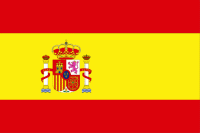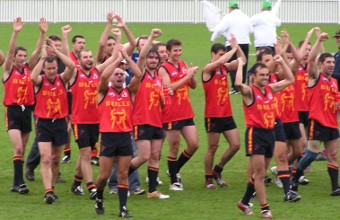Welcome to World Footy News Friday, February 13 2026 @ 01:41 am ACDT
 | Spain |  |
This page is a quick snapshot of the status of Australian Football in Spain. For further information, browse our news items or use the search facility. If you wish to contact football officials from the country, please search our site for links to their leagues or clubs, including in our Atlas. If unsuccessful, we can normally assist with putting people in touch.
Approx population (2009): 47 million
National side: Spanish Bulls - Toros de España
Governing body: not confirmed
WFN Census (2004): 5 teams, 58 seniors, 0 juniors (including Catalonia)
WFN World Ranking (2008): not ranked
History: Charting the history of Australian football in Spain is complicated by internal political issues within the country, namely the desire by some within the Catalan regions to be considered a separate country. This site makes no comment either way on that desire but must confront it in discussing the sport's progress.
There are two primary Australian football regions in Spain, that in Madrid which grew to prominence as the Madrid Bears and contributed most of the players for the Spanish Bulls' debut at the 2005 International Cup, and the other in the Catalan region (the capital of which is Barcelona although Valls has been the leading area for Aussie Rules).
The Madrid program began around 2003, with the Madrid Bears club playing internal matches. They hosted the tourist Australian side the Convicts the same year, and the inaugural Central European Australian Football League Championships, the forerunner to the EU Cup. With help from expatriates in Australia, they competed in IC2005 as the Spanish Bulls, performing solidly early without success before fading badly as lack of numbers became an issue. The program then appeared to drop off almost completely for a couple of years, before a revival with a new team, the Kangaroos, in nearby Móstoles. This gave the Madrid side a local opponent and in 2009 they competed for the Dingo Cup, and as Spain they have remained active such as at the 2009 EU Cup.
The Catalan program began around 2000, with small games organised, leading to the 2005 creation of the Lliga de Futbol Australià de Catalunya (Catalan Australian Football League), LFAC. In some ways this program appeared to become more active than that in Madrid, with at one stage four teams and staging what they called the World 9s, though featuring mostly local sides. In 2009 the LFAC competition grew to include sides from Andorra and Perpignan in France, neighbouring areas with Catalan heritage.
See also Catalonia
Outlook (2010): The Catalonian league appears to have a solid base although it has fluctuated quite a lot over the years. The Madrid base appears to have been rebuilt after slumping; time will tell whether it continues to grow. Overall the strength of Aussie Rules in Spain as a whole might improve through the Madrid system and/or the Catalonians. But it is also possible that the Spanish national side may ebb while the Catalonians thrive but may or may not be eligible for tournaments such as the International Cups.
Catalonia and Spain were both foundation members of the EAFA (now the AFL Europe), with the decision taken that as they had operated independently for so long they had a legitimate claim to be included as separate entities.
Other points of interest: The Catalonia / Spain separation will provide all the interest needed for the foreseeable future.
Last Updated: Friday, April 29 2011 @ 09:59 pm ACST| Hits: 5,280 


 RSS news
RSS news Twitter
Twitter Facebook
Facebook